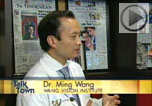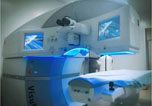- Over 55,000 LASIK and cataract procedures (including on over 4,000 doctors)
- The FIRST center in TN to offer Laser Cataract Surgery
- Introduced bladeless all-laser LASIK to the state
- Implanted the state's first FOREVER YOUNG™ Lens
- The first surgeons in the US to perform a new Intacs surgery to treat keratoconus
- Helped patients from 40 states and 55 countries
- International referral center for cataract surgery and LASIK complications
- Read Dr. Wang's book: LASIK Vision Correction
Why did you decide to have LASIK? Why did you choose Dr. Wang? How has your life changed since your LASIK procedure?
What is your advice for people considering LASIK?
Click to read more
| Article Library | Print This Page |
Big Decisions, Part 2: Private Practice or Academics?
by Ming Wang, MD, PhD, Wang Vision 3D Cataract and LASIK Center, Nashville, Tennessee
Young Ophthalmologists, April 2009.
You’ve graduated from medical school, gone through your rotations, settled on ophthalmology, and possibly even made your decision about whether or not to do a fellowship. And, even with all of these decisions, you have yet another to make: do you go into private practice or enter the academic arena?
There are many things to consider when making this choice:
- Are there significant salary differences?
- What is a typical career path?
- What are the career opportunities?
- What will my workload look like?
- How many openings are there in each field?
As with any decision, there are pluses and minuses to each option.
The Advantages of Academics
According to Ming Wang, MD, a Nashville ophthalmologist who spent several years on the faculty of Vanderbilt University, there are three key benefits to pursuing academics. One is the intellectual stimulus of an environment where you can interact with multiple colleagues and subspecialists. In academics, continuing education and intellectual pursuits are highly encouraged. Because there are many opportunities to teach residents and grow intellectually, you are able to learn from others every day.
Conversely, private practice is more isolated; learning must take place on a self-driven level. If, at the end of the day, your main satisfaction is derived from intellectual pursuits and academic challenges, Dr. Wang suggests that a career in academics would be a good option.
The second advantage of academics is stability. In academics, you see patients with the greatest need, so you have the opportunity to build a reputation, as well as a patient base, due to the draw of the medical school’s or university’s reputation. This is critical for YOs at a time when you need to draw patients but haven’t yet established yourself.
Private practice presents a much different situation, due to changes in the practice of ophthalmology over the years. For instance, Dr. Wang notes that there were fewer surgeons in the past. “Today, there are many more surgeons (especially cataract),” he said. “As a result, young ophthalmologists have to build and train to garner greater capabilities to market to their prospective patients.”
The third advantage of academics owes to economic changes. In the past, you could start a private practice with a relatively small capital investment and maintain it at moderate cost. Today, you need substantial capital to start and sustain a practice, due in large part to advances in technology, as well as the need for marketing. In academics, however, the institution often has already made the investment in the technology.
Choosing Academics
These advantages were persuasive for Pedram Hamrah, MD, a member of the YO Info editorial board who is a full-time ophthalmology instructor and clinician-scientist at Harvard Medical School. For Dr. Hamrah, academics was a clear choice, given his love of research and teaching. “The patients you see at an academic institution are very interesting and different every day,” he says. “Additionally, as a clinician-scientist, as long one can secure funding, one can explore many different research areas at any time, both from bench to bedside, as well as from bedside to bench.”
Dr. Hamrah also liked the idea of being able to spend more time with patients than he felt he could if he were in private practice. And, as Dr. Wang said, the idea of being around bright, young minds all the time appealed to Dr. Hamrah. “I am constantly challenged and have to keep up to par,” says Dr. Hamrah. “It really makes me stay up on the knowledge.”
The challenge of seeing difficult cases was another strong pull for Dr. Hamrah, as was the ability to work with top-of-the-line equipment, which allows him to offer better patient care.
Even so, he is the first to say that there can be challenges in the academic world as well. “On average, there is a clear salary difference between academics and private practice,” Dr. Hamrah says. “While the pay is about the same when you start out, down the line, growth is more limited in academics. Plus, as a clinician-scientist, there is the constant pressure to secure funding or the research will stall.”
The politics of the academic world can also be difficult for some YOs, especially in a large institution. This factor demands a lot of tact and diplomacy. And it can take a long time to accomplish things or get a decision or approval for a project.
Nevertheless, for Dr. Hamrah, the advantages of academics outweigh the challenges. For him, a benefit of academics is that there are several other colleagues and fellows who can temporarily cover patients while away. “This means I get to spend more dedicated time in the lab or attend a meeting knowing that my patients are in safe hands,” Dr. Hamrah says. “This may not always be the case in private practice.”
The Advantages of Private Practice
So what are ophthalmologists like Dr. Hamrah missing when they choose academics? Dr. Wang, who has been in private practice since 2002, says there are three key advantages to private practice. The first is the freedom that private practice affords you, a freedom that can be limited in academics. The increased complexity and size of educational centers and hospitals mean more bureaucratic layers, greater complexity and the aforementioned politics — all of which reduces personal freedom. In Dr. Wang’s view, a YO who is original and ambitious and who prizes his or her creativity and individuality will likely be stifled in a large medical center and would be better served in private practice.
And unlike academics, private practice gives you the ability to stand out and differentiate yourself. In today’s medical environment, technology is constantly changing and improving, and YOs need to be able to adapt and change with it. Dr. Wang cites the merging of refractive and cataract surgery as one example. “In the past, ophthalmologists would have only needed to focus on one or the other,” he says. “But today, you need to be able to consistently adjust and redefine your focus.”
In private practice, you can do this. You are already a leader in your practice and you can dictate a shift in the practice as the market need arises. You can retrain staff and bring on other or additional physicians, since the practice is within your control. In academics, you have less control and a smaller piece of the pie. In addition, academics entails greater specialization and less flexibility, making it more difficult to change direction or focus.
Furthermore, there’s the greater opportunity for financial reward down the road in private practice. “You can incorporate the business aspect of ophthalmology,” Dr. Wang says, “because today’s practice is much more of a business than it was in the past.” This lends itself very well to marketing, which translates to more patients and more revenue.
Choosing Private Practice
For Susan Fish, MD, an ophthalmologist in a Houston group practice, freedom was the primary motivation for choosing private practice. “I get to be my own boss and have greater ability to be in control of how I practice ophthalmology,” she says. “I can set my own schedule, take off when I want, choose what insurances I want to accept and which procedures I want to perform.”
Dr. Fish says she felt academic ophthalmology would mean less freedom in her schedule and more things to juggle, between making time for research, teaching, clinic and surgeries. She found that private practice fit her personality best, giving her the ability to schedule her work and know what to expect on a daily basis.
While she acknowledges that you can make a good living with either choice, Dr. Fish sees greater risks and responsibilities in private practice. “You must market yourself, find your niche in the community and work hard every day to fill your schedule,” she explains. “There are slow times and busy times, thus you must manage your time and money for feast and famine.”
Summary
As Dr. Wang demonstrates, there are compelling advantages to both academics and private practice. What it really comes down to is determining which environment is best suited to your personality and the way you want to practice medicine. Dr. Fish had this advice: “Since ophthalmology consumes a great deal of our lives, I recommend choosing a path that coincides with your beliefs, philosophy, personality and lifestyle.”
Whether that path leads you to academics or private practice, the final outcome should be practicing the art and science of ophthalmology to the best of your ability
link: http://www.aao.org/yo/newsletter/200904/article02.cfm
Our new texbooks
A 501c(3) charity that has helped patients from over 40 states in the US and 55 countries, with all sight restoration surgeries performed free-of-charge.




















